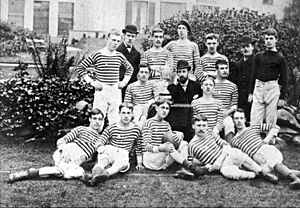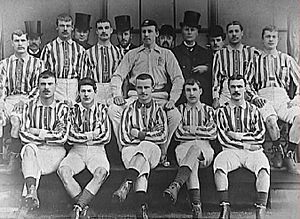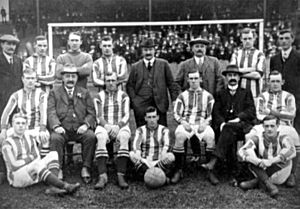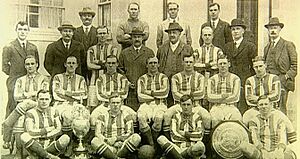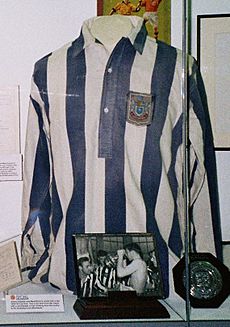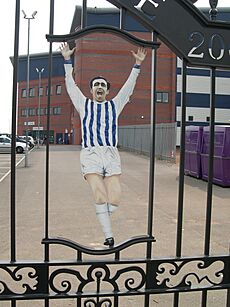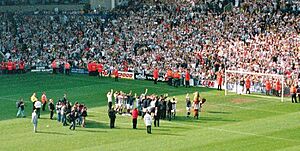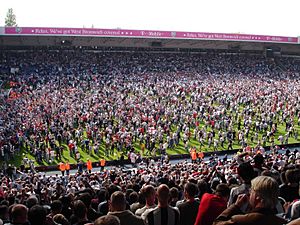History of West Bromwich Albion F.C. facts for kids
West Bromwich Albion Football Club is an English football team from West Bromwich. The club started in 1878 as West Bromwich Strollers. It was formed by workers from Salter's Spring Works in West Bromwich. The team changed its name to West Bromwich Albion in 1880. Albion has played its home games at The Hawthorns stadium since 1900.
Albion was one of the first teams to join The Football League in 1888. They have spent most of their history playing in England's top football division. They won the league title once, in 1919–20, and were runners-up twice. The club has won the FA Cup five times. Their first FA Cup win was in 1888, and their most recent was in 1968, which was their last major trophy. They also won the Football League Cup in 1966. Albion's longest time in the top division was from 1949 to 1973. From 1986 to 2002, they spent their longest time outside the top division. Recently, the club has done better, playing thirteen seasons in the Premier League since 2002.
Contents
Early Years: 1878–1902
The club began in 1878 as West Bromwich Strollers in West Bromwich. Most of the Strollers players worked at George Salter's Spring Works. They were keen cricketers looking for a sport to play in winter. The 'Strollers' name came from having to walk to nearby Wednesbury to buy a football. They were renamed West Bromwich Albion in 1879 or 1880. They were the first team to use the Albion name. Albion was a part of West Bromwich where some players lived.
For their first two seasons, Albion played local teams in parks. In the 1881–82 season, they joined the Birmingham & District Football Association. This allowed them to play in their first competition, the Birmingham Senior Cup. Their strong performance in this cup made them famous in the local newspapers.
By 1882, they also joined the Staffordshire FA. After another good run in the Birmingham Cup, they won their first trophy, the Staffordshire Cup. They beat Stoke 3–2. This win helped them gain national attention. Albion started playing against famous teams like Preston North End and Blackburn Rovers.
They also moved to a new ground called Four Acres. In 1883–84, they entered the FA Cup for the first time. The club became professional in 1885. In 1886, they reached the FA Cup final for the first time but lost to Blackburn Rovers. They reached the final again in 1887, losing to Aston Villa.
In 1888, they won the FA Cup for the first time. They beat strong favourites Preston North End 2–1 in the final. In March 1888, William McGregor invited Albion to help form a new league. Later that year, Albion became one of the twelve founding members of the Football League.
Albion won their second FA Cup in 1892, beating Aston Villa 3–0. They met Villa again in the 1895 final but lost. The team was relegated to Division Two in 1900–01. This was their first season at The Hawthorns. However, they were promoted back as champions the next season. Chippy Simmons was the top goalscorer in Division Two that year.
Building Success: 1902–1948
In May 1902, Fred Everiss, a 19-year-old, became the club's secretary-manager. He stayed in this role for 46 years. The team did well when they returned to Division One. They were at the top of the league for much of the season. But a poor run of 11 games without a win ended their title hopes. Albion was relegated again in 1903–04. This time, they did not return quickly to Division One.
They won the Division Two championship again in 1910–11. The next season, they reached another FA Cup Final, but lost to Second Division Barnsley.
After the First World War, Albion won the Football League title in 1919–20. This was the only time in their history they won the league. They scored 104 goals and earned 60 points, both new league records. Fred Morris was the league's top goalscorer with 37 goals. The team finished as Division One runners-up in 1924–25.
In 1930–31, Albion won promotion to Division One. In the same season, they also won the FA Cup. They beat local rivals Birmingham 2–1 in the final. This "Double" of winning the FA Cup and promotion in the same season has not been achieved since. Albion reached the final again in 1935, losing to Sheffield Wednesday. In 1935–1936, W. G. Richardson scored 39 league goals, which is still a club record. Albion was relegated to Division Two in 1937–38. Football was suspended when the Second World War started in 1939.
The Modern Era: 1948–1973
When Fred Everiss retired in 1948, Albion hired its first modern manager, Jack Smith. He led the team to promotion in 1948–49. This started the club's longest time in the top division, lasting 24 years.
A talented new team began to form, with players like Ronnie Allen joining in 1950. The board wanted trophies, so Smith was dismissed in 1952. Juventus coach Jesse Carver took over and brought new training methods. His replacement, Vic Buckingham, built on this, creating an intelligent, attacking team.
In 1953–54, Albion had their most successful season. They almost won the League and Cup double. They were top of the league for most of the season but finished as runners-up to rivals Wolves. However, Albion did win the FA Cup, beating Preston North End 3–2 in the final. The 1953–54 team was known for its fluent, attacking football and was called "The Team of the Century."
In 1957, Albion reached the cup semi-finals but lost to Aston Villa. That year, they also became the first British professional team to win a game in the Soviet Union. The 1950s also saw the arrival of players like Don Howe, Derek Kevan, and Bobby Robson.
In September 1964, a young striker named Jeff Astle joined the club. Jimmy Hagan became manager in 1963. He built a strong team, leading them to a League Cup win in 1966. Albion beat West Ham 5–3 on aggregate in the final. The team's attack was led by Astle and Tony Brown.
The next season, Albion lost in the League Cup final to Third Division Queens Park Rangers. In 1967, Alan Ashman replaced Hagan. Ashman led Albion to their fifth FA Cup victory in 1968. Astle, known as 'The King,' became the first player to score in every round of the competition. They beat Everton 1–0 in the final with an extra-time goal from Astle. In 1969, Albion reached the FA Cup semi-finals again. The following year, they reached the League Cup final but lost to Manchester City. Jeff Astle became the first player to score in both an FA Cup and League Cup final.
Former Albion player Don Howe became manager in 1971. He had just coached Arsenal to the League and Cup double. However, he could not stop Albion from being relegated to the Second Division in 1973.
Ups and Downs: 1973–1986
Albion failed to get promoted back the next season, and Astle left in 1974. Johnny Giles became player-manager. Giles helped Albion get promoted back to the First Division in 1976. He stayed for another year, leading them to a good finish.
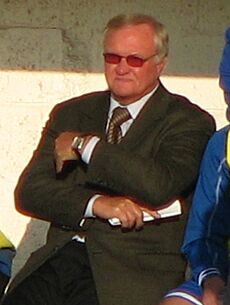
In 1978, a young manager named Ron Atkinson joined the club. He had a team with young players like Bryan Robson and Derek Statham, plus black players Laurie Cunningham and Cyrille Regis. Atkinson also brought Brendan Batson to the team. This was the first time an English team had three black players playing at the same time. They became known as the Three Degrees and helped challenge racism in English football. Their success opened doors for many black footballers. Albion reached the 1978 FA Cup semi-final but lost to Ipswich Town.
In May 1978, Albion became the first British professional team to play in China. They toured for three weeks, playing four matches. The team challenged for the Division One title in 1978–79. However, too many games and a late-season slump meant Albion finished third. This was their highest league finish in over 20 years. Albion also reached the UEFA Cup quarter-final. Albion's 5–3 win away at Manchester United in December 1978 was the last time an away team scored five goals at Old Trafford.
Atkinson's team played exciting football. But in 1979, the club started selling key players. Cunningham moved to Real Madrid for a record fee. Albion finished 3rd and 4th in the First Division and reached the FA Cup semi-finals twice. But they did not win any trophies. Atkinson left to manage Manchester United F.C. in 1981.
Ronnie Allen returned as manager. When Atkinson wanted to buy Bryan Robson and Remi Moses, the board encouraged Allen to sell them. Albion reached the semi-finals of both domestic cups. However, a usual slump after Christmas meant they needed to win their last home game against Leeds United to stay in the division. They won 2–0, and Leeds was relegated instead.
Allen was moved to a different role, and Ron Wylie took over. He resigned in 1984. Then, Johnny Giles, Norman Hunter, and Nobby Stiles took charge. They were called "The A Team." Things improved for a while. However, Albion's money problems forced Giles to sell players. By October 1985, Giles resigned. Nobby Stiles took over but only lasted a few months. Ron Saunders replaced him. By this time, Albion was at the bottom of the table. They were relegated with their worst record ever.
Challenges and Comebacks: 1986–2000
The Albion directors kept faith in Saunders after relegation. He tried to rebuild the team. But these changes did not stop the club's decline. He was sacked in 1987 after they finished in the bottom half of the Second Division.
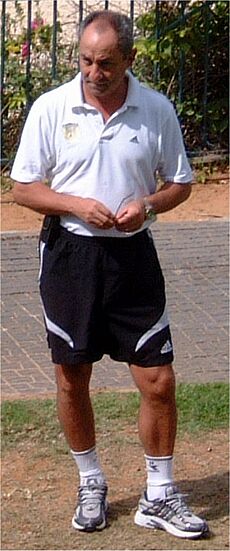
Atkinson returned to Albion in 1987. They looked like promotion contenders in 1988-89. But Atkinson left for Atlético Madrid in November 1988. Midfielder Brian Talbot became player-manager. Talbot's start was good, but their form dropped, and they missed the play-offs. In 1989–90, Albion finished 20th in the Second Division, their lowest position ever. The board sacked Talbot in January 1991 after a 4–2 home loss to non-league Woking in the FA Cup. Bobby Gould replaced him. He could not stop Albion from being relegated to the Third Division for the first time.
Albion just missed the Third Division play-offs in 1992. Bobby Gould resigned, and Ossie Ardiles took over. Ardiles was in charge for only one season. He led them to promotion. They beat Port Vale 3–0 at Wembley. This was their first time at Wembley in over twenty years. Bob Taylor was the top scorer in Division Two with 30 goals.
Ardiles then left to manage Tottenham Hotspur. His assistant Keith Burkinshaw took over. Albion avoided relegation back to Division Two at the end of 1993–94. Safety was secured on the final day with a 1–0 win over Portsmouth. Burkinshaw was sacked, and Alan Buckley replaced him. Albion's form under Buckley was often poor, but just enough to avoid relegation.
Buckley was sacked in January 1997. Ray Harford replaced him. Harford led Albion to Division One safety in 1996–97. The team started the next season well, in the top six. Harford then left for QPR. Denis Smith took over, but Albion finished 10th. In 1998–99, striker Lee Hughes scored 31 league goals. But Albion finished only 12th, and Smith was sacked. His successor Brian Little was also sacked in March 2000, with Albion in danger of relegation.
New Millennium Success: 2000–2010
Gary Megson became the new West Bromwich Albion manager in March 2000. His arrival brought a revival for Albion. Megson quickly signed new players. A 2–0 win over champions Charlton Athletic on the last day of the season kept Albion in Division One. Megson's changes continued in 2000–01. Albion finished sixth, their highest league finish since 1986. They qualified for the Division One promotion play-offs.
In 2001–02, Albion reached the FA Cup quarter-finals. In the league, the team was 11 points behind rivals Wolves with eight games left. Albion won seven and drew one of their remaining games. They overtook Wolves to gain automatic promotion to the Premiership. They finished as runners-up to Manchester City. Promotion was secured on the final day with a 2–0 home win against Crystal Palace. Chairman Paul Thompson left the club, and Jeremy Peace took over. Albion won only six games in their first Premiership season and were relegated.
In the 2003–04 season, Albion had their best League Cup run in 22 years. They beat Newcastle United and Manchester United before losing to Arsenal. In the league, the team stayed in the top two from October until the end of the season. They won promotion back to the Premiership, again as runners-up.
The club won only one of their first 11 games in 2004–05. Gary Megson was sacked in October. Former Albion midfielder Bryan Robson replaced him. The team did not win a game under Robson until January 2005. Results improved later in the season. With one game left, Albion was bottom of the Premiership. On the last day of the season, Albion beat Portsmouth 2–0. Other teams failed to get the results they needed. Albion became the first team in Premiership history to avoid relegation after being bottom at Christmas.
Albion was relegated in the 2005–06 season. Robson left the club in September 2006. Tony Mowbray replaced him. In Mowbray's first game, Albion beat Wolves 3–0. Albion briefly led the Championship in February. A 7–0 win over Barnsley on the final day secured a play-off spot. They beat Wolves in the semi-finals. This led them to the final at Wembley Stadium against Derby County, but Albion lost 1–0.
In 2007–08, West Brom reached the FA Cup semi-finals for the first time since 1982. They lost 1–0 to Portsmouth at Wembley Stadium. A month later, they won promotion to the Premier League by winning the Football League Championship. However, the next year they were relegated again. Tony Mowbray left to manage Celtic. Roberto Di Matteo was appointed as the new manager. After a successful season, Albion was promoted to the Premier League again.
Recent Years: 2010–Present
Roberto Di Matteo led the club back to the Premier League. But he was dismissed in February 2011. Roy Hodgson replaced him. Hodgson guided Albion to an 11th-place finish in 2010–11. In May 2012, Hodgson left to become the manager of the England national team.
Steve Clarke then led Albion to an eighth-place finish in 2012–13. This was their highest finish in the Premier League. But he was sacked halfway through the next season. Pepe Mel replaced him but left at the end of the season. After Alan Irvine's short time, Tony Pulis was appointed head coach on January 1, 2015.
On August 5, 2016, the club was sold to a Chinese investment group led by Guochuan Lai. John Williams replaced Peace as chairman. Pulis was sacked in November 2017 due to poor results. Alan Pardew replaced him. After only one win in 18 league matches, Pardew left in April 2018. Despite a good run of form under caretaker manager Darren Moore, West Brom was relegated after eight seasons in the Premier League.
After relegation, Darren Moore was confirmed as manager on May 18, 2018. He was tasked with leading the team back to the Premier League. However, he was sacked on March 9, 2019, even though the team was 4th in the table. This sacking was criticized by the media. Albion finished 4th in their first season back in the Championship. They qualified for the Championship play-offs under caretaker manager James Shan. However, the team lost to Aston Villa in the play-off semi-final.
Slaven Bilić was appointed as Albion boss on June 13, 2019. He was sacked on December 16, 2020. Sam Allardyce replaced him on the same day.
Images for kids
 | Charles R. Drew |
 | Benjamin Banneker |
 | Jane C. Wright |
 | Roger Arliner Young |


